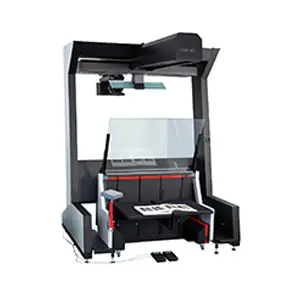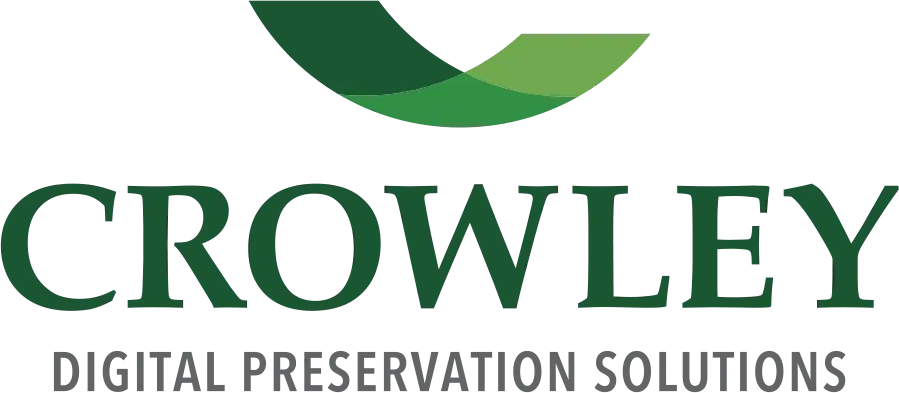Zeutschel Ps and Qs at Maine State Library
The Zeutschel OS Q Scanner adds Production Capabilities to Maine State Library’s Digital Preservation Program
A few weeks past, The Crowley Company hosted a series of well-attended Zeutschel OS Q online demo events to introduce this impressive A0-A2 overhead and cultural heritage scanner series to an audience that is still largely non-traveling.

One of the highlights of the event was a live use-case discussion with Adam Fisher, Director of Collections, Digital Initiatives and Promotion for the Maine State Library (MSL). Interviewed by Crowley vice president of sales and marketing, Matthew McCabe, Fisher discussed the Library’s history, collections and digitization program, including how it both lends and shares its four Zeutschel scanners (three Zeutschel 12002 Advanced models*purchased in 2015 and the OS Q A1 model purchased in 2020).
If you’ve got 15 minutes, the interview is worth a listen. And if you think the office/library behind Adam looks even more quiet than your typical library…it is! The library is undergoing a three-year renovation and paired with the recent (and ongoing) pandemic, it is essential personnel only so we’re especially appreciative of Adam’s time and appearance.
About Maine State Library

The Library also lends its scanners; two of the Zeutschel OS 12002 models are located elsewhere in the State to broaden the digital reach of the library and negate the need for travel to Augusta. Additionally, it allows the remaining OS 12002 and the new OS Q1 to be used onsite by smaller Maine institutions that have a collection to digitize and share. In fact, says Fisher, “We actually don’t have paid digitization staff. All of our work is done by volunteers or by the staff or volunteers of the visiting institutions.”
But ‘b’ comes before ‘d’ and before there was digital, there were books. The Maine State Legislature authorized the purchase of books in 1836 and the library has been growing exponentially since then. Today, the Maine State Library resides in the State House complex along with the Maine State Archives and the Maine State Museum.
Why the OS Q scanner?

As Fisher explains, “We scan for access, but also for preservation. We needed a scan system that could offer both OCR for searchability and which could give us an accurate representation of the original. Many of the ledgers and older materials have pages which are disintegrating; it’s critical we capture these to ensure that we have a representative copy and to reduce any further wear and tear on the originals.”
The impetus for the new scanner search came about from a desire to scan newspaper spreads. The Library staff considered several overhead scanners and ultimately chose the Zeutschel OS Q for several reasons:
- Known technical support. According to Fisher, the Library staff’s experience with Crowley’s support staff made it a “no-brainer” to purchase from Crowley again. He specifically noted that Crowley technicians had experience with scanning themselves and with coaxing maximum image quality from a scanner, both of which led to a clear understanding of the Library teams’ workflow requirements. The Crowley technicians assisted with installation, training, identifying workflows, building processes and even with de-installing, moving and re-installing/calibrating the scanners to make way for the Library’s renovation. Says Fisher, “With Crowley, it’s really been about the relationship.”
- Familiarity with Zeutschel’s OmniScan software. All Zeutschel overhead scan systems employ the easy-to-use OS12 (OmniScan, version 12) software for capture, quality assurance and workflow. Engineered specifically for cultural heritage capture of a wide variety of still media types in all conditions, OS12 allows for unlimited job presets, meaning that the capture parameters can be set for a specific project – i.e. the ledgers Fisher mentions in his interview – and an operator can go back to those presets any time a project has been interrupted. This is enormously helpful in an environment where a scanner has multiple operators on multiple projects as it eliminates the time it takes to reset project parameters and helps to foster consistent image quality and output across operators. Additionally, because MSL staff and volunteers have worked with OmniScan since 2015, purchasing another Zeutschel vastly reduced the software learning curve.
- Image quality and output. Fisher cited the importance of superior image quality, particularly when navigating the OCR (optical character recognition) of the narrow type and thin columns that are so common in historic documents. The team has been scanning at 600 dpi with “great success” and enjoys the convenience of being able to scan “multiple derivities from the same scan at the same time.” The OS Q can deliver uncompressed TIFF, PDF, full color, grayscale, black and white and other file formats on one image simultaneously. Zeutschel’s OS HQ model provides even more star power with a DPI resolution up to 1000. All OS Q models are capable of consistent FADGI four-star output.
- Production efficiency. With so many projects, visiting institutions and volunteer operators, the Maine State Library’s Zeutschel scanners are heavily accessed. In addition to job presets and multiple derivatives from a single scan, the OS Q scans bilaterally, digitizing images on both the front and back passes of the camera head. This dramatically reduces scan time and increases operator efficiency. Via the OS12 software, multiple images can be scanned in a single pass as either one combined image or as separate images, again saving time and effort and increasing scan capacity.
In closing, Fisher notes that having the Zeutschel OS Q has helped to make the Maine State Library “future proof.” With its state-of-the-art technology designed for the evolution of digitization guidelines and requirements, the OS Q will be an essential tool in the preservation of Maine history for years to come.
Update:
As of September 2023, Zeutschel no longer manufactures the OS 12002-Series. Its replacement, the OS C, offers the same ease of use, image quality, and flexible software options perfect for library, archival and research use.

Crowley’s former Director of Communications, Cheri Baker, retired in 2022 but retains her love for writing and all things Crowley. With a career that spans newspaper, agency, and corporate communications, her goal remains to dig behind the scenes and tell the story – whatever it may be.
